#Edward Grove
Explore tagged Tumblr posts
Text

#doctor who#dw#dr who#eighth doctor#big finish#big finish doctor who#big finish audios#charley pollard#the chimes of midnight#Edward Grove#memes#dw memes#doctor who memes#shitpost#shit post
187 notes
·
View notes
Text
Edward Grove is alive!
2 notes
·
View notes
Text
theres just so many interesting things you could do if you staged chimes of midnight tbh....
#two actors for edith (older and younger) and having the older sing behind other dialogue#separate actor for edward grove so when he possesses shaughnessy the two actors speak at the same time#to be honest you could have two actors for just about everyone except maybe the doctor#and probably not shaugnessy since he doesnt die. but whenever the others die have understudies either play the corpse or stand around in the#background outside the lights. so theyre just visible but clearly shelved#as the mystery gradually becomes clear slowly have the older edith shadowing the staff as they say things that were said to her#the screams when the older edith is explaining - just have younger edith and mary and mrs baddeley and whoever else offstage and scream with#with their mics off - then you get a surround sound effect too - esp if you have them offstage behind or to the side of the audience#YOU COULD HAVE A DOLLHOUSE IN THE PARLOR WHEN THE DOCTOR'S CALLED UPSTAIRS TOO#itd be even more effective if you showed it at the beginning#maybe as the audience is filtering in you just have the lights up on that set so they SEE it yk?#then once everyones seated have the lights go off suddenly (maybe even play the theme song)#idk how youd do the jam jar im not a theater person. maybe red fabric for the jam that can 'spill' all over charley in a concerning looking#way (that can look like how edith looks when she kills herself) but that doesnt necessitate a costume change or any sort of cleanup for the#stage itself. BUT. the problem is the jar. i wouldnt want to use breakaway glass bc 1) cleanup 2) id want to have something you could put#back together quickly that would be indicative of the time loop#but again im not a theater person so i dont know stuff maybe that would be easy and you COULD use breakaway glass. or whatever im NOT a#person who knows really much at all about theater#ari opinion hour
8 notes
·
View notes
Text




Oppenheimer (2023)
#2023#gif#film#movie#WWII#Oppenheimer#Christopher Nolan#Trond Fausa#George Kistiakowsky#Matt Damon#Leslie Groves Jr.#Josh Peck#Kenneth Bainbridge#Cillian Murphy#J. Robert Oppenheimer#Julius Robert Oppenheimer#Benny Safdie#Edward Teller#Josh Hartnett#Ernest Lawrence#Jack Quaid#Richard Feynman#Emily Blunt#Kitty Oppenheimer#Florence Pugh#Jean Tatlock#Robert Downey Jr.#Lewis Strauss#Gary Oldman#Harry S. Truman
84 notes
·
View notes
Text
Oppenheimer as animals (a thread)








#oppenheimer#edward teller#leslie groves#enrico fermi#ernest lawrence#katherine Oppenheimer#walter zinn#albert einstein#meme#animal au
11 notes
·
View notes
Text
she edward on my grove til it's alive
#bad post! couldn't even word the joke properly ✌ but if edward grove can do a bad job saying shit. so can i#abbey.txt#the chimes of midnight#dw#bfa#eighth doctor
42 notes
·
View notes
Text
'Christopher Nolan has a knack for wrangling impressive ensemble casts for his films, but he really outdid himself with his 3-hour historical epic Oppenheimer. Even if the World War II biopic didn’t include the frequent Nolan collaborator Michael Caine, the stacked ensemble is filled with a terrific ensemble of veteran Hollywood stars, Academy Award-winning performers, underrated character actors, relative unknowns, and a few former box office titans that have seemingly disappeared over the last decade or so. It wasn’t that long ago that Josh Hartnett was the marquee lead of films like Lucky Number Slevin and Black Hawk Down, but his star power has seemingly evaporated, as some actors can only maintain the same level of success for so long. However, Hartnett has always been a more interesting and complicated actor than the roles that he was given at the beginning of his career. Hartnett isn’t just in the middle of a major comeback; he basically steals Oppenheimer with one of the most nuanced supporting performances.
Why Is 'Oppenheimer's Ernest Lawrence So Important?
Oppenheimer is told in non-chronological order, in what has become a hallmark of nearly all of Nolan’s films. While Hartnett doesn’t play a significant role in the black-and-white sections that show the confirmation hearings for Lewis Strauss (Robert Downey Jr.), he is instrumental within the main storyline focused on J. Robert Oppenheimer’s (Cillian Murphy) studies at the University of California in Berkeley, where he first conceived of much of the technology that ended up becoming critical within the Manhattan Project. The sequences in Berkeley aren’t just where Oppenheimer unlocks part of his genius, but also where he falls in love with his second wife Kitty (Emily Blunt), and makes a community of friends for the first time. It is during this period that he works hand-in-hand with Hartnett’s depiction of Ernest Lawrence; having an outsider’s perspective on Oppenheimer’s work was necessary for this sequence to function.
Ernest Lawrence was an incredibly influential figure in Oppenheimer’s life. While he’s not someone that Oppenheimer often looks up to and idolizes like Neils Bohr (Kenneth Branagh) or Albert Einstein (Tom Conti), Lawrence represents the sort of man that Oppenheimer could never really become. Hartnett depicts Lawrence as a man of great importance, intelligence, and class that also has a relatively normal social life and shows an ability to adjust to the stresses within his life. Lawrence encourages Oppenheimer to find a balance within his work, but it becomes obvious that it’s not possible for someone with his capacity for genius. It creates an odd tension between them; Lawrence feels both resentful and sympathetic for his friend. Oppenheimer’s inability to simply “turn off” his brain and focus on something other than his work may end up making him more historically important than Lawrence, but it negates any sense of accomplishment or happiness he may feel.
Josh Hartnett does some really outstanding subtle work with his performance, as there’s an interesting dichotomy to Lawrence’s feelings about Oppenheimer. He’s not resentful, as he and Oppenheimer are able to get along and share much in common due to their shared experience in nuclear research. Lawrence is someone who can communicate with Oppenheimer on an intellectual level about the groundbreaking studies that are being done, but he’s not capable of reaching the same next-level conclusions. Lawrence is well-educated and knows what he’s talking about, but also acknowledges that it’s not his name that the world will remember. It was almost a bit of reflective acting on Hartnett’s part as if he was acknowledging that he was no longer the same star who had led Pearl Harbor to its box-office success two decades prior.
Ernest Lawrence Is Important to the Politics of 'Oppenheimer'
Christopher Nolan isn’t necessarily known as a “political filmmaker,” but while his films aren’t necessarily as overt as the work of directors like Oliver Stone or Spike Lee, there are strong anti-war, anti-escalation themes in The Dark Knight, Dunkirk, and Tenet. Oppenheimer is definitely Nolan’s most overtly political work to date, and Lawrence is instrumental in unpacking the film’s complex understanding (and criticism) of the decisions that Oppenheimer made on behalf of his country during his lifetime. At first, Oppenheimer’s relationship with Jean Tatlock (Florence Pugh) is nothing more than a passionate romantic affair, but it's Lawrence who explains the danger that being involved with the socialist political movement at the time that they are in. Lawrence has his personal feelings about the rising Communist movement, but he worries that Oppenheimer’s mind could be distracted when he’s working on studies that could literally change the way that mankind observes the world.
The political differences between Lawrence and Oppenheimer are fascinating, and Hartnett does a great job of showing Lawrence’s conviction in his belief and handling the dense political dialogue. It’s fascinating that Lawrence’s political beliefs aren’t delved into that deeply other than his expressed desire to keep all discussions about the socialist movement out of the classroom. Lawrence tells Oppenheimer that he considered himself a patriot, but he also wants the University to be an institute of science, and not a hangout spot for a potentially dangerous movement to begin. He and Oppenheimer begin to grow further apart as a result of this, but they still share a mutual understanding of which events transcend their own personal beliefs. Both men react with the same surprise and fear when news of Adolf Hitler’s invasion of Poland breaks.
Josh Hartnett does a great job of showing Lawrence’s empathy for Oppenheimer. While he understands that a traditional celebration isn’t necessarily something that Oppenheimer would enjoy, there’s a friendliness between the two men that continues after General Leslie Groves (Matt Damon) whisks him away to work on the Manhattan Project. Lawrence refuses to report incriminating evidence on Oppenheimer during the government’s investigation, and the two are able to shake hands at the end of the film. That’s more than Oppenheimer can say about Edward Teller (Benny Safdie), whose pro-nuclear beliefs created too much of a divide between them.
Josh Hartnett is in the midst of a much-needed comeback, and it’s great to see that Oppenheimer gave him such a nuanced role to execute. While it may have taken a while for him to finally get the chance to work with Nolan, his performance is one that is essential to show what made Oppenheimer tick on both an intellectual and personal level.'
#Josh Hartnett#Ernest Lawrence#Christopher Nolan#Oppenheimer#Leslie Groves#Matt Damon#Edward Teller#Benny Safdie#Lucky Number Slevin#Black Hawk Down#Pearl Harbor#Michael Caine#Lewis Strauss#Robert Downey Jr.#Kitty#Emily Blunt#Neils Bohr#Kenneth Branagh#Tom Conti#Albert Einstein#Florence Pugh#Jean Tatlock#The Dark Knight#Dunkirk#Tenet
57 notes
·
View notes
Text

6 notes
·
View notes
Text
PLAYER PROFILE : Ethan Edwards
#hockey#umich hockey#umich#umich boys#michigan wolverines#michigan hockey#spruce grove saint#ethan edwards#ee73#njd#nj devil
15 notes
·
View notes
Text
CHRISTMAS PARTY AT 22 EDWARD GROVE!
Arrive on the 24th of December to count down the hours until midnight!
Come one, come all! We'll have a hours and hours of merriment playing a murder mystery game, a great big turkey for Christmas dinner, and who can forget about Mrs. Baddeley's plum pudding! Christmas just wouldn't be Christmas without Mrs. Baddeley's plum pudding. It just wouldn't be Christmas.
Come to Edward Grove, Christmas Eve!
#shitpost#the chimes of midnight#audio: the chimes of midnight#edward grove#doctor who#dw#dr who#classic who#eighth doctor#charley pollard#mrs. baddeleys plum pudding#christmas#big finish doctor who#big finish audios#big finish#christmas eve
194 notes
·
View notes
Text
Who i currently am writing for
Billy Loomis (scream)
Stu macher (scream)
Ethan Landry (scream)
Roman Godfrey (hemlock Grove)
Spencer Charnas (ink)
Andy biersack (bvb)
Gerard Way (MCR)
Frank iero (MCR)
Edward Nygma (Gotham)
Jerome Valeska (Gotham)
Jeremiah valeska (Gotham)
Herbert West (re animator)
Art the clown (terrifier)
Adrian Chase (Peacemaker)
Requests are open!!!
#ice nine kills#spencer charnas#andy biersack#black veil brides#gerard way#frank iero#my chemical romance#mcr danger days#hemlock grove#roman godfrey#scream 1996#scream 6#billy loomis#stu macher#ethan landry#johnny slaughter#the texas chainsaw massacre#edward nygma#gotham tv show#jerome valeska#jeremiah valeska#willy wonka#wonka movie#re animator#herbert west#art the clown#art the clown x reader
28 notes
·
View notes
Text
…why is the sound creature listed under “Children” on Charley’s TARDISwiki page but not the Doctor’s?
#Edward Grove *is* listed on the *eighth* doctor’s page#as well as Charley’s#but neither is on the general Doctor page#(with Susan’s father; Miranda; Jenny; something called The Sapling; and ‘the Doctor’s children’ not further specified)#I imagine in fact this just gets fought over a lot and changed back and forth#doctor who#big finish#eighth doctor#charley pollard
18 notes
·
View notes
Text
Multifandom — How Villains are Made
An edit of my own imagination. I own no music or clips to this video, please don’t take it down! 🥺
#Gotham#Hannibal#American Horror Story#Underworld#Hemlock Grove#Supernatural#Queen of the Damned#Harry Potter#Sherlock#Scream#From Dusk Till Dawn#Oswald Cobblepot#Bruce Wayne#Edward Nygma#Jerome Valeska#Will Graham#James Patrick March#Mary Eunice#Tate Langdon#Michael Langdon#Selene#Roman Godfrey#Sam Winchester#Akasha#Draco Malfoy#Tom Riddle#Bellatrix Lestrange#Billy Loomis#Stu Macher#Jim Moriarty
13 notes
·
View notes
Text
Why Robert Oppenheimer's Atomic Bomb Still Haunts Us
— By Richard Rhodes | Published May 15, 2013
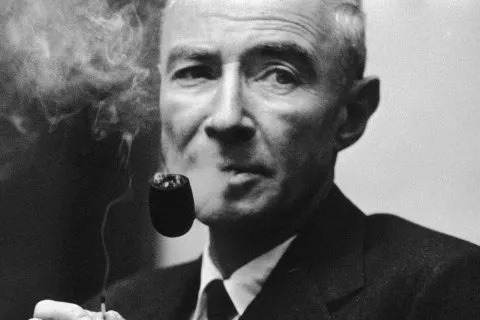
Oppenheimer spearheaded the creation of the atom bomb. René Burri/Magnum
Robert Oppenheimer oversaw the design and construction of the first atomic bombs. The American theoretical physicist wasn't the only one involved—more than 130,000 people contributed their skills to the World War II Manhattan Project, from construction workers to explosives experts to Soviet spies—but his name survives uniquely in popular memory as the names of the other participants fade. British philosopher Ray Monk's lengthy new biography of the man is only the most recent of several to appear, and Oppenheimer wins significant assessment in every history of the Manhattan Project, including my own. Why this one man should have come to stand for the whole huge business, then, is the essential question any biographer must answer.
It's not as if the bomb program were bereft of men of distinction. Gen. Leslie Groves built the Pentagon and thousands of other U.S. military installations before leading the entire Manhattan Project to success in record time. Hans Bethe discovered the sequence of thermonuclear reactions that fire the stars. Leo Szilard and Enrico Fermi invented the nuclear reactor. John von Neumann conceived the stored-program digital computer. Edward Teller and Stanislaw Ulam co-invented the hydrogen bomb. Luis Alvarez devised a whole new technology for detonating explosives to make the Fat Man bomb work, and later, with his son, Walter, proved that an Earth-impacting asteroid killed off the dinosaurs. The list goes on. What was so special about Oppenheimer?
He was brilliant, rich, handsome, charismatic. Women adored him. As a young professor at Berkeley and Caltech in the 1930s, he broke the European monopoly on theoretical physics, contributing significantly to making America a physics powerhouse that continues to win a freight of Nobel Prizes. Despite never having directed any organization before, he led the Los Alamos bomb laboratory with such skill that even his worst enemy, Edward Teller, told me once that Oppenheimer was the best lab director he'd ever known. After the war he led the group of scientists who guided American nuclear policy, the General Advisory Committee to the U.S. Atomic Energy Commission (AEC). He finished out his life as director of the prestigious Institute for Advanced Study in Princeton, New Jersey, where he welcomed young scientists and scholars into that traditionally aloof club.
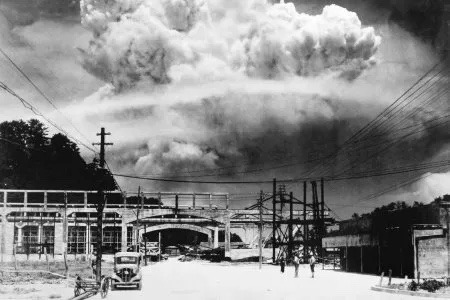
August 9, 1945: Nagasaki is hit by an atom bomb. Nagasaki Atomic Bomb Museum/EPA
Those were exceptional achievements, but they don't by themselves explain his unique place in nuclear history. For that, add in the dark side. His brilliance came with a casual cruelty, born certainly of insecurity, which lashed out with invective against anyone who said anything he considered stupid; even the brilliant Bethe wasn't exempt. His relationships with the significant women in his life were destructive: his first deep love, Jean Tatlock, the daughter of a Berkeley professor, was a suicide; his wife, Kitty, a lifelong alcoholic. His daughter committed suicide; his son continues to live an isolated life.
His Choices or Mistakes, Combined with his Penchant for Humiliating Lesser Men, Eventually Destroyed Him.
Oppenheimer's achievements as a theoretical physicist never reached the level his brilliance seemed to promise; the reason, his student and later Nobel laureate Julian Schwinger judged, was that he "very much insisted on displaying that he was on top of everything"—a polite way of saying Oppenheimer was glib. The physicist Isidor Rabi, a Nobel laureate colleague whom Oppenheimer deeply respected, thought he attributed too much mystery to the workings of nature. Monk notes his curiously uncritical respect for the received wisdom of his field.
Monk's discussion of Oppenheimer's work in physics is one of his book's great contributions to the saga, an area of the man's life that previous biographies have neglected. In the late 1920s Oppenheimer first worked out the physics of what came to be called black holes, those collapsing giant stars that pull even light in behind them as they shrink to solar-system or even planetary size. Some have speculated Oppenheimer might have won a Nobel for that work had he lived to see the first black hole identified in 1971.
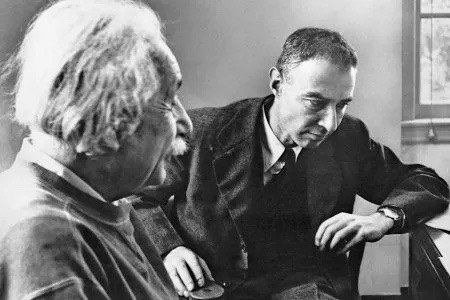
Oppenheimer with Albert Einstein, circa the 1940s. Corbis
Oppenheimer's patriotism should have been evident to even the most obtuse government critic. He gave up his beloved physics, after all, not to mention any vestige of personal privacy, to help make his country invulnerable with atomic bombs. Yet he risked his work and reputation by dabbling in left-wing and communist politics before the war and lying to security officers during the war about a solicitation to espionage he received. His choices or mistakes, combined with his penchant for humiliating lesser men, eventually destroyed him.
One of those lesser men, a vicious piece of work named Lewis Strauss, a former shoe salesman turned Wall Street financier and physicist manqué, was the vehicle of Oppenheimer's destruction. When President Eisenhower appointed Strauss to the chairmanship of the AEC in the summer of 1953, Strauss pieced together a case against Oppenheimer. He was still splenetic from an extended Oppenheimer drubbing delivered during a congressional hearing all the way back in 1948, and he believed the physicist was a Soviet spy.
Strauss proceeded to revoke Oppenheimer's security clearance, effectively shutting him out of government. Oppenheimer could have accepted his fate and returned to an academic life filled with honors; he was due to be dropped as an AEC consultant anyway. He chose instead to fight the charges. Strauss found a brutal prosecuting attorney to question the scientist, bugged his communications with his attorney, and stalled giving the attorney the clearances he needed to vet the charges. The transcript of the hearing In the Matter of J. Robert Oppenheimer is one of the great, dark documents of the early atomic age, almost Shakespearean in its craven parade of hostile witnesses through the government star chamber, with the victim himself, catatonic with shame, sunken on a couch incessantly smoking the cigarettes that would kill him with throat cancer at 63 in 1967.
Rabi was one of the few witnesses who stood up for his friend, finally challenging the hearing board in exasperation, "We have an A-bomb and a whole series of it [because of Oppenheimer's work], and what more do you want, mermaids?" What Strauss and others, particularly Edward Teller, wanted was Oppenheimer's head on a platter, and they got it. The public humiliation, which he called "my train wreck," destroyed him. Those who knew him best have told me sadly that he was never the same again.
For Monk as for Rabi, Oppenheimer's central problem was his hollow core, his false sense of self, which Rabi with characteristic wit framed as an inability to decide whether he wanted to be president of the Knights of Columbus or B'nai B'rith. The German Jews who were Oppenheimer's 19th-century forebears had worked hard at assimilation—that is, at denying their religious heritage. Oppenheimer's parents submerged that heritage further in New York's ethical-culture movement that salvaged the humanism of Judaism while scrapping the supernatural overburden. Oppenheimer, actor that he was, could fit himself to almost any role, but turned either abject or imperious when threatened. He was a great lab director at Los Alamos because of his intelligence—"He was much smarter than the rest of us," Bethe told me—because of his broad knowledge and culture; because of his psychological insight into the complicated personalities of the gifted men assembled there to work on the bomb; most of all because he decided to play that role, as a patriotic citizen, and played it superbly.
Monk is a levelheaded and congenial guide to Oppenheimer's life, his biography certainly the best that has yet come along. But he devotes far too many pages to Oppenheimer's Depression-era flirtation with communism, a dead letter long ago and one that speaks more of a rich esthete's awakening to the suffering in the world than to Oppenheimer's political convictions. He doesn't always get the science right. Most of the errors are trivial, but a few are important to the story.
Their Fundamental Objection Was to Giving up Production of Real Weapons so That Teller Could Pursue His Pipe Dream, a Dead-end Hydrogen Bomb Design.
A fundamental reason Oppenheimer opposed a crash program to develop the hydrogen bomb in response to the first Soviet atomic-bomb test in 1949 was the requirement of Edward Teller's "Super" design for large amounts of a rare isotope of hydrogen, tritium. Tritium is bred by irradiating lithium in a nuclear reactor, but the slugs of lithium take up space that would otherwise be devoted to breeding plutonium. To make tritium for a hydrogen bomb that the U.S. did not know how to build would have required sacrificing most of the U.S. production of plutonium for devastating atomic bombs the U.S. did know how to build. To Oppenheimer and the other scientists on the GAC, such an irresponsible substitution as an answer to the Soviet bomb made no strategic sense. It's true that the hydrogen bomb with its potentially unlimited scale of destruction made no military sense to them either—and was morally repugnant to some of them as well. But their fundamental objection, which Monk overlooks, was to giving up production of real weapons so that Teller could pursue his pipe dream, a dead-end hydrogen bomb design that never worked.
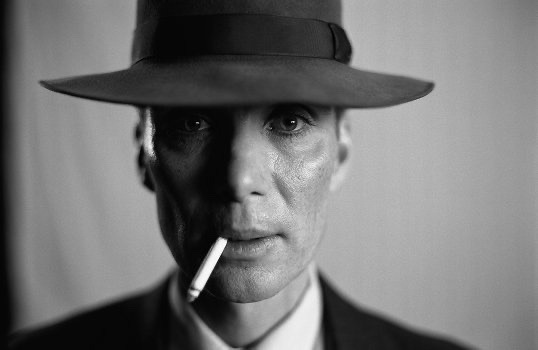
Julius Robert Oppenheimer (April 22, 1904 – February 18, 1967)
More egregious is Monk's notion that the Danish physicist Niels Bohr, Oppenheimer's mentor during the war on the international implications of the new technology, pushed for the bomb's use on Japan to make its terror manifest. He did not. He pushed, to the contrary, for the Allies, the Soviet Union included, to discuss the implications of the bomb prior to its use and to devise a framework for controlling it. Bohr foresaw that the bomb would stalemate major war, as it has, but correctly feared that U.S. secrecy about its development would lead to a U.S.-Soviet arms race. He conferred with both Roosevelt and Churchill about presenting the fact of the bomb to the Russians as a common danger to the world, like a new epidemic disease, that needed to be quarantined by common agreement. Churchill vehemently disagreed, and Roosevelt was old and ill. The moment passed. The arms race followed, as Bohr foresaw, and with diminished force, among pariah states like Iran and North Korea, continues to this day.
Monk's Oppenheimer is a less appealing figure than the Oppenheimer of previous biographies, perhaps because, as an Englishman, Monk is less susceptible to Oppenheimer's rhetorical gifts and more candid about calling out his evasions. He pulls together most of what several generations of Oppenheimer scholars have found and offers new revelations as well. Yet there's a faint whiff of condescension in his portrait, and the real Oppenheimer, the man whom so many loved and admired, still somehow escapes him. He misses the deep alignment of Robert Oppenheimer's life with Greek tragedy, the charismatic hubris that was his glory but also the flaw that brought him low. But maybe I'm expecting too much: maybe only a large work of fiction could assemble that critical mass.
#Robert Oppenheimer#Atomic Bomb#Richard Rhodes#World War II#Manhattan Project#Ray Monk#Gen. Leslie Groves#Pentagon#Hydrogen Bomb#Edward Teller | Stanislaw Ulam#Nobel Prize#Princeton University#Albert Einstein#President Eisenhower#Lewis Strauss#Hydrogen | Tritium | Plutonium#Roosevelt | Churchill#US — Soviet Union
17 notes
·
View notes
Text
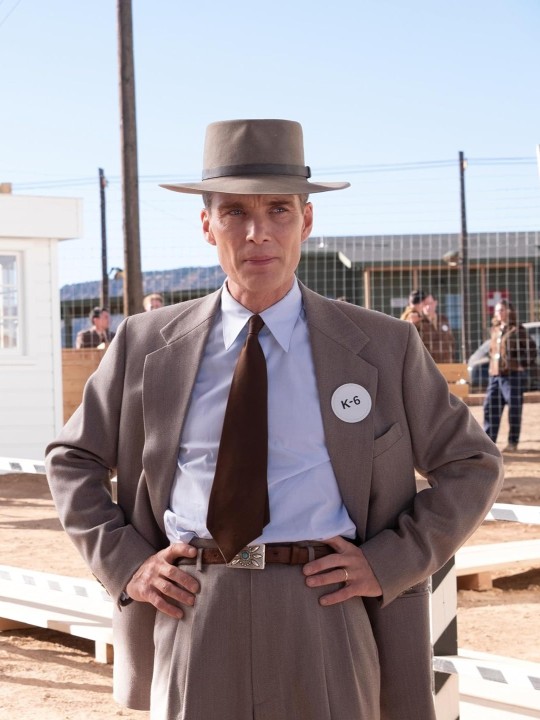
Oppenheimer (2023)
#2023#film#movie#WWII#Oppenheimer#Christopher Nolan#Cillian Murphy#J. Robert Oppenheimer#Julius Robert Oppenheimer#Benny Safdie#Edward Teller#Emily Blunt#Kitty Oppenheimer#Matt Damon#Leslie Groves Jr.#Robert Downey Jr.#Lewis Strauss#Josh Hartnett#Ernest Lawrence#Florence Pugh#Jean Tatlock#Jack Quaid#Richard Feynman#Gary Oldman#Harry S. Truman#Manhattan Project#Trinity#Los Alamos#New Mexico
28 notes
·
View notes
Text
I finally have time to do some giffing of Oppenheimer, so if you guys have any requests please send them in and I'll gif them!!!
I, of course, already am doing all of Lawrence's scenes but if you guys have any others that you would like to see, please let me know.
#oppenheimer#Oppenheimer movie#christopher nolan#Chris nolan#Cillian murphy#j Robert oppenheimer#Robert oppenheimer#Ernest lawrence#josh hartnett#benny Sadie#Edward teller#Leslie groves#matt damon#Casey affleck#colonel pash#Richard feynman#jack quaid
11 notes
·
View notes